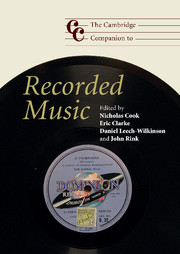Book contents
- Frontmatter
- Introduction
- Learning to live with recording
- A short take in praise of long takes
- 1 Performing for (and against) the microphone
- Producing a credible vocal
- ‘It could have happened’: The evolution of music construction
- 2 Recording practices and the role of the producer
- Still small voices
- Broadening horizons: ‘Performance’ in the studio
- 3 Getting sounds: The art of sound engineering
- Limitations and creativity in recording and performance
- Records and recordings in post-punk England, 1978–80
- 4 The politics of the recording studio: A case study from South Africa
- From Lanza to Lassus
- 5 From wind-up to iPod: Techno-cultures of listening
- A matter of circumstance: On experiencing recordings
- 6 Selling sounds: Recordings and the record business
- Revisiting concert life in the mid-century: The survival of acetate discs
- 7 The development of recording technologies
- Raiders of the lost archive
- The original cast recording of West Side Story
- 8 The recorded document: Interpretation and discography
- One man's approach to remastering
- Technology, the studio, music
- Reminder: A recording is not a performance
- 9 Methods for analysing recordings
- 10 Recordings and histories of performance style
- Recreating history: A clarinettist's retrospective
- 11 Going critical: Writing about recordings
- Something in the air
- Afterword: Recording: From reproduction to representation to remediation
- Notes
- Bibliography
- Discography
- Index
From Lanza to Lassus
Published online by Cambridge University Press: 28 September 2011
- Frontmatter
- Introduction
- Learning to live with recording
- A short take in praise of long takes
- 1 Performing for (and against) the microphone
- Producing a credible vocal
- ‘It could have happened’: The evolution of music construction
- 2 Recording practices and the role of the producer
- Still small voices
- Broadening horizons: ‘Performance’ in the studio
- 3 Getting sounds: The art of sound engineering
- Limitations and creativity in recording and performance
- Records and recordings in post-punk England, 1978–80
- 4 The politics of the recording studio: A case study from South Africa
- From Lanza to Lassus
- 5 From wind-up to iPod: Techno-cultures of listening
- A matter of circumstance: On experiencing recordings
- 6 Selling sounds: Recordings and the record business
- Revisiting concert life in the mid-century: The survival of acetate discs
- 7 The development of recording technologies
- Raiders of the lost archive
- The original cast recording of West Side Story
- 8 The recorded document: Interpretation and discography
- One man's approach to remastering
- Technology, the studio, music
- Reminder: A recording is not a performance
- 9 Methods for analysing recordings
- 10 Recordings and histories of performance style
- Recreating history: A clarinettist's retrospective
- 11 Going critical: Writing about recordings
- Something in the air
- Afterword: Recording: From reproduction to representation to remediation
- Notes
- Bibliography
- Discography
- Index
Summary
My serious involvement with recordings, which has already lasted fifty-five years, has given me much of my musical education as well as endless inspiration. Growing up in the South African countryside, I was largely dependent for entertainment on what we had in the house. The Broadwood baby grand piano was vital: my father played by ear (hence my predilection for James P. Johnson and the Harlem stride style) but my mother played only from printed music – we regularly sang songs round the piano to her accompaniment. I do not recall that we listened to the radio much but we had two cupboards full of 78 rpm discs. Among the twelve-inch records, housed in strong cardboard boxes, were classic sets: Toscanini's 1936 NYPSO Beethoven Seventh; Stokowski's Philadelphia Petrushka; the Grieg Concerto with Moiseiwitsch; Faust with Marcel Journet; Fritz Busch's Glyndebourne Don Giovanni; Lucia di Lammermoor with Pagliughi; the plum label Rigoletto with Piazza, Pagliughi and Folgar; and, perhaps most important for my early development, La traviata with Guerrini, Infantino and Silveri. Our ten-inch discs were often not even dignified with paper covers but stood in convenient piles from which eight would be selected at random to be placed on the ‘record changer’ in the radiogram. We always had background music at dinner and it might be anything from Roberto Inglez or Amalia Rodriguez to Sir George Henschel or Richard Tauber or, at the lighter extreme, Layton and Johnstone, Bing Crosby, Danny Kaye or the Andrews Sisters.
- Type
- Chapter
- Information
- The Cambridge Companion to Recorded Music , pp. 98 - 101Publisher: Cambridge University PressPrint publication year: 2009



